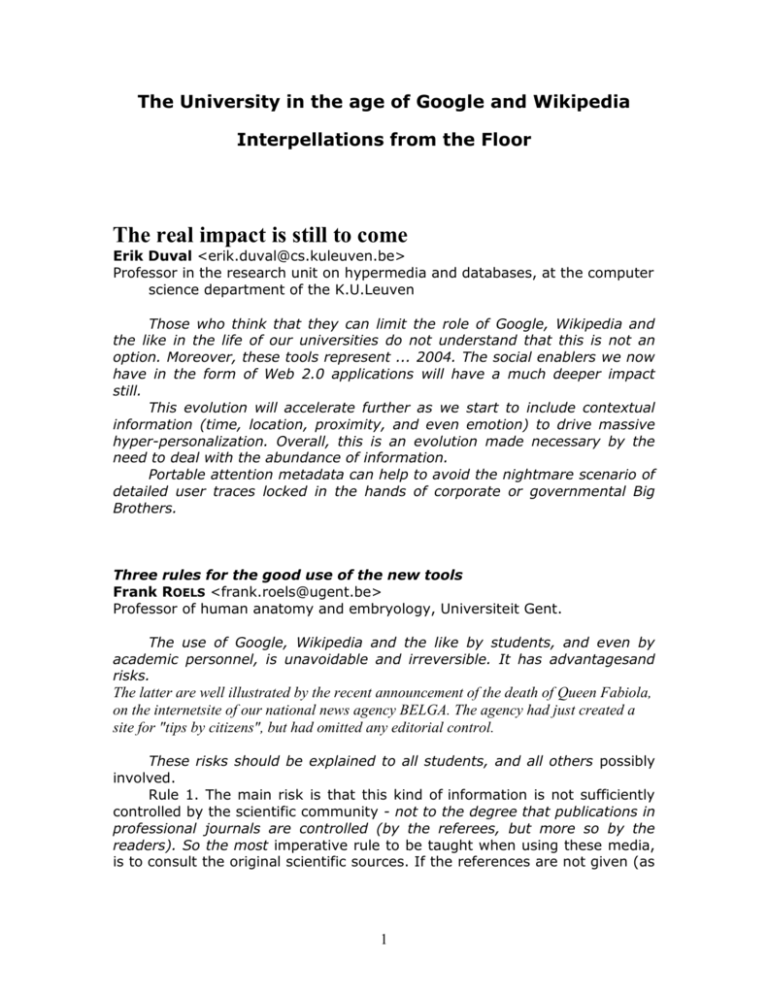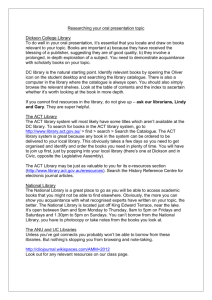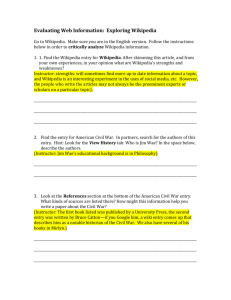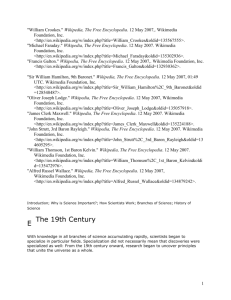The University in the age of Google and Wikipedia
advertisement

The University in the age of Google and Wikipedia Interpellations from the Floor The real impact is still to come Erik Duval <erik.duval@cs.kuleuven.be> Professor in the research unit on hypermedia and databases, at the computer science department of the K.U.Leuven Those who think that they can limit the role of Google, Wikipedia and the like in the life of our universities do not understand that this is not an option. Moreover, these tools represent ... 2004. The social enablers we now have in the form of Web 2.0 applications will have a much deeper impact still. This evolution will accelerate further as we start to include contextual information (time, location, proximity, and even emotion) to drive massive hyper-personalization. Overall, this is an evolution made necessary by the need to deal with the abundance of information. Portable attention metadata can help to avoid the nightmare scenario of detailed user traces locked in the hands of corporate or governmental Big Brothers. Three rules for the good use of the new tools Frank ROELS <frank.roels@ugent.be> Professor of human anatomy and embryology, Universiteit Gent. The use of Google, Wikipedia and the like by students, and even by academic personnel, is unavoidable and irreversible. It has advantagesand risks. The latter are well illustrated by the recent announcement of the death of Queen Fabiola, on the internetsite of our national news agency BELGA. The agency had just created a site for "tips by citizens", but had omitted any editorial control. These risks should be explained to all students, and all others possibly involved. Rule 1. The main risk is that this kind of information is not sufficiently controlled by the scientific community - not to the degree that publications in professional journals are controlled (by the referees, but more so by the readers). So the most imperative rule to be taught when using these media, is to consult the original scientific sources. If the references are not given (as 1 is often the case in the popular media and internet sites), the data are by definition not trustworthy. Rule 2. A second serious threat, to which there is not the simple solution from above, is the omission of relevant data. We know this to happen also in professional papers, and unless the referee is a real expert in the subject, there is little remedy - a letter to the Editor, but who cares? A good advice is to consult another online source, such as Pubmed in the biomedical field. Do such databanks exist in all disciplines? Rule 3. A third risk is the abundance of superfluous and irrevelant information (such as we professionals encounter while using the wrong combination of key words). So don't let you be distracted and keep in mind your own original question. Unrequested information or publicity (the difference has practically disappeared) is a daily problem on the internet. A radically different type of quality control Maxime LAMBRECHT <maxime.lambrecht@uclouvain.be> Assistant at UCLouvain (Chaire Hoover), starting a doctorate in law on the open source movement and other forms of subversion of intellectual property law The potential benefit of Wikipedia and its clones for the University could be either superficial or tremendous, depending on the willingness of academics to question their implicit assumptions about truth and quality assessment. Firstly, wikis can be of some use if universities want to capitalize on the efficiency of peer production mechanisms, whether by building their own reliable, academic version of wikipedia (such as Citizendium or Google Knol), or by using them to correct factual errors made by authors in their texts (such as Harvard Law Professor Larry Lessig who uses wikis to improve drafts of his own books). Secondly, wikis and peer production mechanisms could at the very least provide a source of inspiration when scientists will eventually emancipate from today's academic journals system, e.g. switching from a fenced academic knowledge to a « publish all and rate all » system of knowledge exchange (as proposed by Brian Withworth). But most importantly, the University can make use of Wikipedia as an opportunity to challenge some of its old habits. Attempting to impose academic criteria of quality assessment on wikipedia may be missing the point: wikipedia's quality control is not necessarily weaker but of a fundamentally different nature. Whereas the academic world makes a strong link between the authorship of distinguished individuals and scholarly authority, between selection and credibility, wikipedia's account of reliability is more a question of resistance to changes made by thousands of anonymous contributors, mostly undistinguished but jointly amazingly wellspoken and well-informed. 2 Before we try to tame Wikipedia, we should maybe ask ourselves : what can we learn from its relationship to knowledge and truth ? Let's integrate our knowledge into the global brain! F. Questier, Vrije Universiteit Brussel Google, Wikipedia and the like have become cornerstones of our information society. Their disruptive innovations were impossible without flirting with the boundaries of privacy and copyright laws. We should remain very critical and teach that even 'don't be evil' Google and non-profit Wikipedia have their limitations and related risks. We should teach what is good and what is bad scholar use of these tools. Even the so-called net-generation does not master the necessary skills and competencies. Wikipedia and Google have proven that mass collaboration and innovative use of web & user data can create services that tend towards collective intelligence. In a certain sense they have become complimentary to the academic knowledge and practices. More important than the question about the role of these internet services in universities is the question about the role of universities in this new collective intelligence. Let's unlock the academic knowledge by embracing open innovation, open access, open learning materials, open standards and open software. Let's teach our students to be not only knowledge consumers and producers, but also knowledge publishers. Today it's not enough to publish single resources, such as articles and books. We have to integrate our knowledge into the global brain. Ethnic art research saved by Wikimedia Paulien VAN DER ZEE <paulina.vanderzee@ugent.be> Curator of the Ethnographical Collections of the Universiteit Gent The Ethnographical Collections of the University of Ghent started presenting their objects as concept files in Wikimedia. Due to a cutback in expenditure the University's department of Ethnic Art is being phased out. Consequently its collections lose their educational function. A group of former students is now trying to give a boost to scientific research in the field of ethnic art by means of a wiki-project, as it offers the opportunity to create a new role for the collections. The philosophy of the project, in which several ethnographic museums worldwide will take part, is that information should be given in the language(s) of the country, in English and in the language of the ethnographic entity from which the objects originate. By making the information available in the native language, one aims to enable the offspring of the makers of ethnographical objects to comment on the information presented, and to supplement it with information which they 3 themselves find of importance. As their way of looking at things is different from that of Western researchers and/or admirers of ethnographic artefacts, a discussion is made possible between these two groups. This exchange of knowledge certainly can be expected to contribute to the strength of this wikimedia project and to inspire new scientific research. 4





